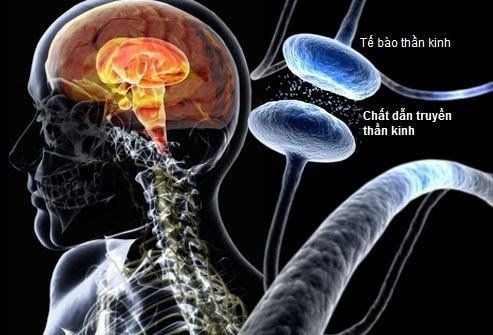This is an automatically translated article.
Research shows that all of us, to a certain extent, have an inherent desire to cultivate positive personality traits (such as extraversion, optimism, and charisma) and minimize negative personality traits. negative points (such as pessimism and neurosis).
1. Change of personality
Personality is everything a person thinks, feels and acts. It can also be a habit, sometimes a strange habit, or the way the person reacts to influences from the world around them.
Although personality is formed and changed through the process of learning and developing oneself throughout life, for some people, certain personality types seem to be attached to them for many reasons such as experiencing health problems or being conservative and obstinate in changing personality.
2. 15 things that can change your personality
15 things that can change a person's personality include:
Alzheimer's disease: Alzheimer's disease affects a person's thinking, judgment, memory, and decision-making ability, leaving them feeling confused mess or even change the action. Alzheimer's disease can also cause personality changes over time. A normally gentle and caring person can also become bossy and often make unreasonable demands, or those who used to be easily worried and stressed can become easygoing and content with everything. Dementia: After alzheimer, this is the next most common type of personality change. Abnormal protein clumps called Lewy form in different areas of the brain and control memory, motor areas and thinking. So dementia can affect both physically and mentally, making people more passive, less emotional, less sociable, and less interested in other hobbies or activities. Parkinson's disease: Parkinson's disease is a typical symptom of hand tremor accompanied by affecting the way of moving, talking, disrupting sleep as well as thinking of the patient. Right from the early stages of the disease, people with impaired concentration, often work carelessly, are absent-minded as well as not sociable in daily relationships.

Bệnh Parkinson ảnh hưởng nghiêm trọng đến chất lượng cuộc sống cũng như các mối quan hệ của người bệnh
Huntington's disease: Huntington's disease can be considered a congenital disease but only manifests symptoms when the patient is between 30 and 40 years old. Huntington's disease damages nerve cells and affects all aspects of a person's life. They are often unaware of what is happening, have difficulty making seemingly simple decisions, sometimes forget even with such basic things as brushing their teeth daily. Multiple Sclerosis: Multiple sclerosis is an autoimmune disease that is acquired when the body's immune system attacks nerve cells in the brain or spinal cord. Multiple sclerosis causes some movement- or bladder-related problems. In many cases the disease leads to a state of extreme excitement, uncontrollable laughter or crying and sometimes is not appropriate for the current situation. Thyroid disease: The thyroid gland is an organ that produces hormones that support the activities of many other organs in the body. When the hormones are overproduced in hyperthyroidism, they can lead to stress, anxiety, irritability, and other mood swings. In cases where the hormone produced by the thyroid gland does not provide enough for the body, the patient may experience memory loss, difficulty making decisions or even lead to dementia if left untreated. timely treatment.

Bệnh cường giáp làm tăng các triệu chứng lo lắng, căng thẳng
Brain cancer: A tumor that forms in the frontal lobe of the brain can affect the area responsible for processing personality and emotions as well as supporting memory. That makes the patient often feel difficult, confused, impaired memory. Brain tumors can also cause mood swings that make people more aggressive and have unrealistic thoughts. Some other types of cancer: Tumors in the brain or spinal cord are not the only types of cancer that affect personality. Cancer of the pituitary gland, which controls hormone levels in the body, can also cause personality changes. In addition, a substance called adenocarcinoma that forms in breast, bowel, lung and pancreatic cancer cells can also affect a person's personality in the same way as brain or pituitary tumors. Stroke: A stroke is a condition in which blood flow to the brain is interrupted due to many reasons, causing nerve cells not to receive enough oxygen and needed nutrients and die. The effects depend on the duration of the stroke and the location of the damage in the brain. People after a stroke can lose mobility and that changes their personality. Stroke patients often lose patience, often change mood and behavior than before.

Bệnh nhân có tiền sử đột quỵ làm thay đổi tính cách của họ
Traumatic Brain Injury: After a major concussion to the head area, changes in personality can be potential symptoms that appear over time. In more severe cases, these traumas make the person feel like a different person, saying or doing things they have never done in the past. Depression: This is not necessarily a medical condition of the body. Not only affects mood, depression also affects what the person thinks, memory and ability to make decisions. Depression is often different in both sexes. While women feel worthless, sad and guilty, men tend to appear tired, often irritable and angry. Obsessive Compulsive Disorder (OCD): OCD causes people to feel anxious, have negative thoughts, and constantly urge themselves not to stop. For example, patients may wash their hands constantly, doubt themselves, and take a long time to complete seemingly simple tasks. OCD will get worse if it is criticized by others, causing anxiety to be pushed higher.

Chứng rối loạn ám ảnh cưỡng chế khiến người bệnh rơi vào trạng thái hoảng loạn, lo lắng
Bipolar Disorder: Bipolar disorder causes mood swings that go beyond the normal ups and downs of everyday life. One of the two sides of the emotion is feeling startled, talking quickly, and making decisions in a hurry. The other side is anxiety and feeling worthless. Sometimes the person can feel a mixture of these two emotional states. The changes that bipolar disorder brings can cause sleep disturbances, energy imbalances and make it difficult to make informed decisions about everything. Schizophrenia: Schizophrenia is a serious illness. The person may hear or see things that are not there or believe in things that are not in reality. Worse, schizophrenia can make people withdrawn, limited contact with people, and personality becomes unpredictable and easy to lose control. The personality of each person is partly formed from the lifestyle, what they are exposed to, and learned from a young age. Although each person always wants to highlight positive and negative traits, but in general, human personality is very difficult to change. There are a number of reasons or medical conditions that cause a sociable, open-minded person to become withdrawn, shy to communicate, or even have negative thoughts.
It can be an accident that leads to traumatic brain injury, psychological trauma encountered in life or cancer...

Bệnh viện Đa khoa Quốc tế Vinmec là địa chỉ khám chữa bệnh uy tín, chất lượng
Health checkup package diamond general health check-up package Vip special health check-up package Comprehensive general health check-up package Standard general health check-up package Patient's examination results will be returned to your home. After receiving the results of the general health examination, if you detect diseases that require intensive examination and treatment, you can use services from other specialties at the Hospital with quality treatment and services. outstanding customer service.
Please dial HOTLINE for more information or register for an appointment HERE. Download MyVinmec app to make appointments faster and to manage your bookings easily.
Articles refer to sources: greatergood.berkeley.edu, webmd.com












